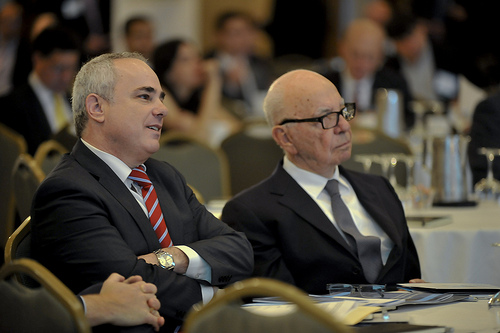Rupert Murdoch – head of a criminal corporation – lying for Israel
Why I had to leave the Times
Robert Fisk 11 July 2011
Then, in the spring of 1983, another change. I had, with Douglas-Home's full agreement, spent months investigating the death of seven Palestinian and Lebanese prisoners of the Israelis in Sidon. It was obvious, I concluded, that the men had been murdered – the grave-digger even told me that their corpses had been brought to him, hands tied behind their backs, showing marks of bruising. But now Douglas-Home couldn't see how we would be "justified" in running a report "so long after the event".
 "Murdoch was owner of The Times when I covered the blood-soaked Israeli invasion and occupation of Lebanon in 1982. Not a line was removed from my reports, however critical they were of Israel. After the invasion, Douglas-Home and Murdoch were invited by the Israelis to take a military helicopter trip into Lebanon. The Israelis tried to rubbish my reporting; Douglas-Home said he stood up for me. On the flight back to London, Douglas-Home and Murdoch sat together. "I knew Rupert was interested in what I was writing," he told me later. "He sort of waited for me to tell him what it was, although he didn't demand it. I didn't show it to him."
"Murdoch was owner of The Times when I covered the blood-soaked Israeli invasion and occupation of Lebanon in 1982. Not a line was removed from my reports, however critical they were of Israel. After the invasion, Douglas-Home and Murdoch were invited by the Israelis to take a military helicopter trip into Lebanon. The Israelis tried to rubbish my reporting; Douglas-Home said he stood up for me. On the flight back to London, Douglas-Home and Murdoch sat together. "I knew Rupert was interested in what I was writing," he told me later. "He sort of waited for me to tell him what it was, although he didn't demand it. I didn't show it to him."
But things changed. Before he was editor, Douglas-Home would write for the Arabic-language Al-Majella magazine, often deeply critical of Israel. Now his Times editorials took an optimistic view of the Israeli invasion. He stated that "there is now no worthy Palestinian to whom the world can talk" and – for heaven's sake – that "perhaps at last the Palestinians on the West Bank and in the Gaza Strip will stop hoping that stage-strutters like Mr Arafat can rescue them miraculously from doing business with the Israelis."
All of which, of course, was official Israeli government policy at the time.
Then, in the spring of 1983, another change. I had, with Douglas-Home's full agreement, spent months investigating the death of seven Palestinian and Lebanese prisoners of the Israelis in Sidon. It was obvious, I concluded, that the men had been murdered – the grave-digger even told me that their corpses had been brought to him, hands tied behind their backs, showing marks of bruising. But now Douglas-Home couldn't see how we would be "justified" in running a report "so long after the event".
In other words, the very system of investigative journalism – of fact-checking and months of interviews – became self-defeating. When we got the facts, too much time had passed to print them. I asked the Israelis if they would carry out a military inquiry and, anxious to show how humanitarian they were, they duly told us there would be an official investigation. The Israeli "inquiry" was, I suspected, a fiction. But it was enough to "justify" publishing my long and detailed report. Once the Israelis could look like good guys, Douglas-Home's concerns evaporated.
...These past two weeks, I have been thinking of what it was like to work for Murdoch, what was wrong about it, about the use of power by proxy. For Murdoch could never be blamed. Murdoch was more caliph than ever, no more responsible for an editorial or a "news" story than a president of Syria is for a massacre – the latter would be carried out on the orders of governors who could always be tried or sacked or sent off as adviser to a prime minister – and the leader would invariably anoint his son as his successor. Think of Hafez and Bashar Assad or Hosni and Gamal Mubarak or Rupert and James. In the Middle East, Arab journalists knew what their masters wanted, and helped to create a journalistic desert without the water of freedom, an utterly skewed version of reality. So, too, within the Murdoch empire."
Full report in the Independent 11 Nov 2011
